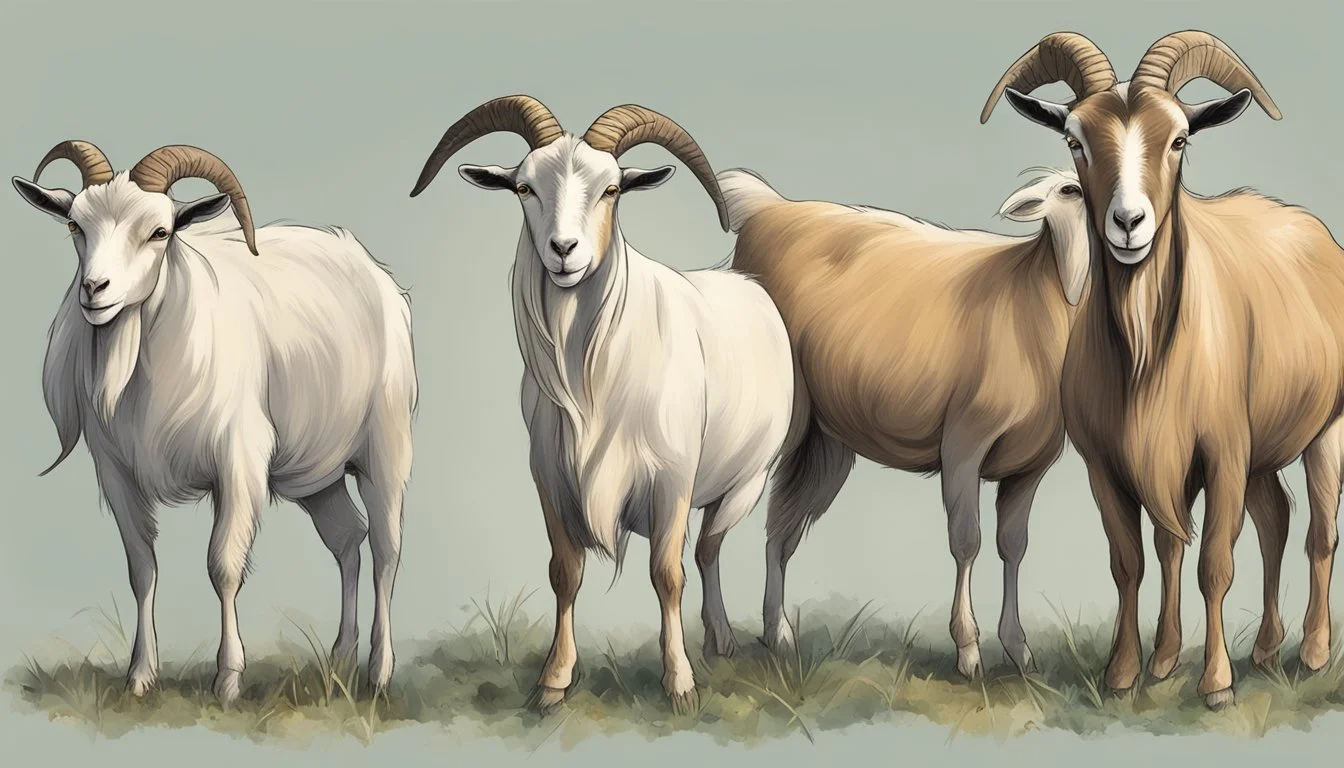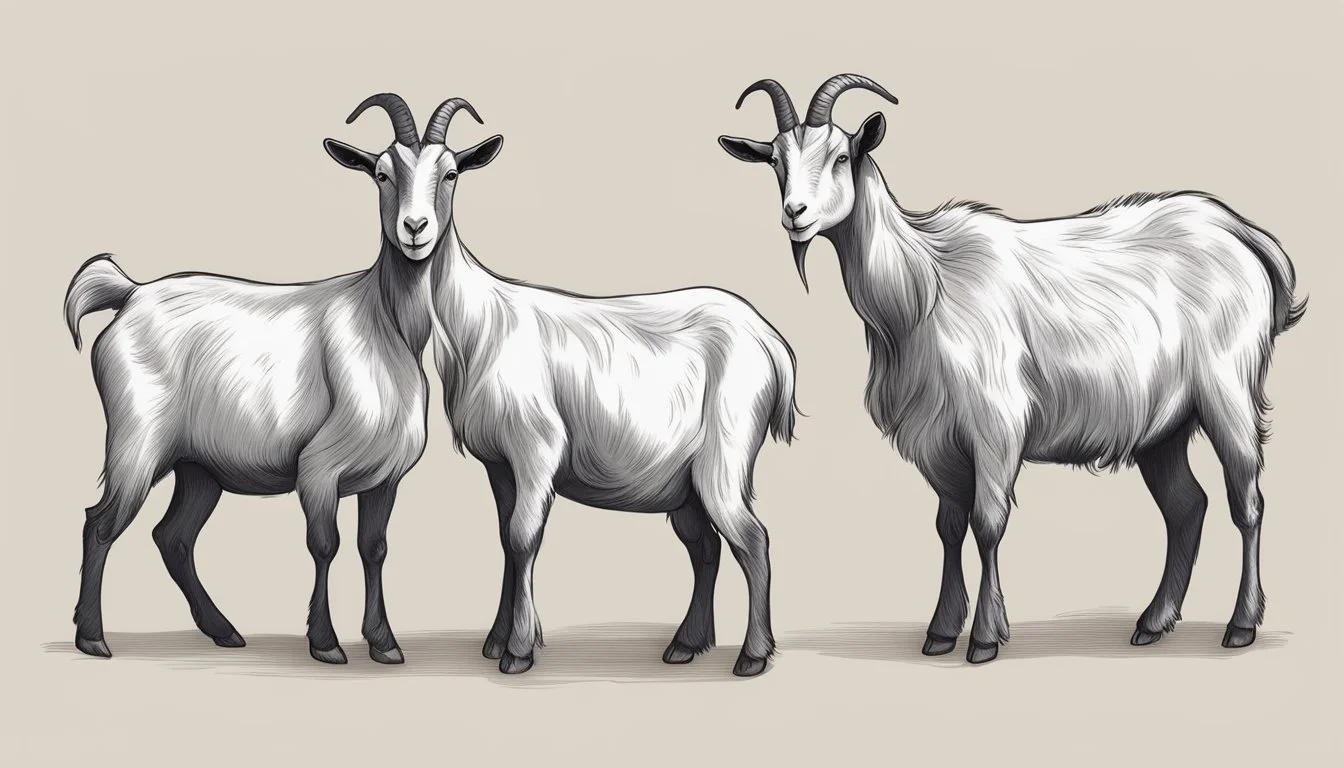What are the Signs of Nutritional Deficiencies in Goats?
Identifying Key Symptoms
Nutritional deficiencies in goats can present through various physical and behavioral signs, and these indicators are critical for goat owners to recognize for timely intervention. Whether it’s a backyard hobby farm or a commercial livestock operation, understanding and recognizing the symptoms of dietary imbalances is essential for maintaining the health and productivity of goats. Common nutrients that goats require include vitamins, minerals, and other dietary essentials, and the lack of these can lead to serious health issues.
The signs of deficiency often manifest in ways that are observable to a seasoned goat keeper. For instance, a deficiency in selenium and vitamin E might lead to White Muscle Disease, characterized by stiffness and difficulty in movement. Inadequate levels of thiamine, or vitamin B1, may cause a range of problems from weight loss to serious neurological disorders such as goat polio.
Observational vigilance is key in goats' diet management, as nutritional imbalances can also stem from an incorrect ratio of nutrients, like a disproportionate calcium to phosphorus ratio potentially leading to urinary calculi. By understanding the dietary requirements and staying alert to the signs of mineral deficiencies, goat owners can ensure their animals receive a balanced diet to support their well-being and productivity.
Understanding Goat Nutrition
Goats have specific dietary needs that must be met to maintain their health and productivity. A balanced diet is critical, as it impacts their growth, milk production, and overall well-being.
Importance of Balanced Diet
A balanced diet is essential for goats to fulfill their energy requirements and maintain good health. Goats, being ruminants, require a diet that includes adequate forage that is rich in fiber, which facilitates proper digestion and rumen function. Grain is often supplemented to provide energy, but it must be introduced gradually to prevent digestive disturbances.
Nutritional Requirements
Protein is a pivotal component of goat nutrition, necessary for growth, milk production, and reproduction. Mineral requirements, including calcium and phosphorus, are critical and must be kept in balance; a 1:1 to 2:1 calcium ratio is often recommended. Goats also need access to clean water to aid in digestion and metabolic processes. Supplementation may be necessary to ensure goats are meeting their nutritional needs, especially when forage quality or availability is low.
Common Nutritional Deficiencies
Nutritional deficiencies in goats can lead to severe health problems that manifest through various physical signs. It is essential to recognize these deficiencies early to manage the health and productivity of the herd effectively.
Mineral Deficiencies
Goats require a balanced intake of several minerals for optimal health, including calcium, phosphorus, magnesium, and sulfur. Calcium deficiency might appear as rickets in kids or osteomalacia in adults, leading to weak bones and difficulty standing. A shortage of phosphorus can result in pica, a condition where goats chew on non-food materials.
Another common deficiency is in copper, which affects a goat’s coat, causing it to become faded and rough. Moreover, selenium and zinc play critical roles in immunity and enzyme functions, where a deficiency might manifest through poor growth, weak immunity, or hoof problems. Furthermore, iodine deficiency can lead to goiter, reproductive issues, and decreased milk production.
Notable Mineral Deficiencies in Goats:
Calcium: Weak bones, rickets
Phosphorus: Pica, reduced appetite
Magnesium: Grass tetany, muscle weakness
Sulfur: Poor growth, reduced feed efficiency
Copper: Faded coat, anemia
Selenium: Weak immunity, muscular dystrophy
Zinc: Hoof issues, poor skin condition
Iodine: Goiter, reproductive disturbances
Vitamin Deficiencies
Vitamins are compounds that goats need in small quantities. Deficiencies are seen in the form of various health issues. Vitamin E deficiency is associated with muscular disorders, such as white muscle disease in kids. Vitamins, including B-complex, are crucial for metabolic processes and a deficiency could lead to conditions like polioencephalomalacia, which is marked by neurological symptoms.
Impacts of Vitamin Deficiencies:
Vitamin E: White muscle disease
B Vitamins: Neurological disturbances, poor growth
Macronutrient Shortages
Macronutrients like proteins and fats are essential for maintaining a goat’s body condition and productive functionalities. Insufficient protein intake primarily leads to reduced growth rates and muscle wasting, while an energy deficit can cause weight loss and decreased milk yield. Consistent access to a balanced diet is vital to prevent these issues.
Key Signs of Macronutrient Shortages:
Reduced growth rate
Weight loss, poor milk production
By ensuring a diet that meets the goats' nutritional requirements for minerals, vitamins, and macronutrients, deficiencies and their associated conditions can largely be prevented.
Specific Nutritional Issues in Goats
Nutritional deficiencies in goats can lead to several health issues that vary in severity from reduced performance to life-threatening conditions. An understanding of these specific issues is critical to maintaining the health and productivity of a goat herd.
Pregnancy Toxemia
Pregnancy toxemia, also known as ketosis, occurs most commonly in does carrying multiple fetuses during late gestation. The energy demands exceed the energy intake, leading to the mobilization of adipose tissue and resultant excess ketone bodies. Symptoms include listlessness, poor appetite, and sometimes blindness. Interventions may involve administering propylene glycol to provide a quick energy source and managing diet to ensure adequate glucose levels.
Urinary Calculi
Urinary calculi is a serious condition affecting especially male goats where stones obstruct the urinary tract. The imbalance of the calcium ratio in the diet, often too much phosphorus and insufficient calcium, contributes to this issue. Feeding dietary supplements like anionic salts or ammonium chloride can help prevent the formation of these stones, and a proper balance of minerals, like NaCl and potassium, is essential to urinary health.
Polioencephalomalacia
Caused by a deficiency of thiamine (vitamin B1) or an overdose of sulfur, polioencephalomalacia leads to swelling of the brain, or the liver's inability to synthesize enough thiamine. Quickly recognizing symptoms like disorientation and blindness and administering thiamine can reverse the condition if treated early. Reducing stress factors and maintaining a balanced diet with sufficient B vitamins help prevent its occurrence.
Feeding and Supplementation
Balanced nutrition is crucial for preventing nutritional deficiencies in goats. This involves careful formulation of their diets, understanding appropriate supplement usage, and recognizing the role of water in overall goat health.
Formulating the Right Diet
The foundation of a goat's diet should consist of forage and hay to maintain a healthy rumen. Cereal grains, although energy-rich, should be provided carefully to avoid rumen pH imbalances that can lead to lactic acidosis. It's vital to maintain a diet that supports the specific life stage and exercise needs of the goat, ensuring an optimal body condition score. Goats benefit from a mixture of browse and hay, which provides proteins and fiber to aid digestion and prevent toxicity.
Supplement Usage
Mineral supplements including magnesium, molybdenum, and iodine are often necessary to correct or prevent deficiencies. It’s crucial to tailor supplementation to the forage quality and goat's specific needs. High-starch concentrate supplements, while helpful in providing energy, should be given in controlled amounts to prevent toxicity and ensure proper rumen function.
Water and Diet
Consistent access to clean water complements a well-formulated diet by aiding in nutrient absorption and digestion. Adequate water intake is also vital for the regulation of rumen pH and prevention of urinary calculi. Sufficient hydration supports the metabolism of hay, supplements, and cereal grains, optimizing the nutrient utilization and maintaining body condition score.
Recognizing Clinical Signs
Nutritional deficiencies in goats manifest through a range of clinical signs, both physical and physiological. Vigilance in observing these signs is crucial for prompt intervention and treatment.
Physical and Behavioral Indicators
Physical Appearance: Deficiencies can lead to weight loss and a general deterioration in the animal's condition. For instance, a thiamine deficiency may cause progressive weakness and impaired motor function. Observing the physical state of goats, such as stiffness of joints or changes in coat quality, is indicative of their nutritional status.
Behavior: Behavioral changes, such as altered feeding habits or lethargy, can signal nutritional issues. A well-known condition like milk fever, which may occur when dairy goats are fed a high-concentrate diet or after kidding, presents symptoms like ataxia and muscle tremors.
Dietary Response: Goats might respond to certain dietary components, like added molasses, which can temporarily increase energy but shouldn't be mistaken as a solution to underlying deficiencies.
Laboratory Analysis
Laboratory tests provide a concrete method to confirm nutritional deficiencies. Blood work can reveal specific deficiencies, for example:
Low calcium levels confirming milk fever.
Biochemical indicators resembling thiamine deficiency.
Such analyses can inform decisions on vaccination schedules and dietary adjustments, establishing preventative measures against future deficiencies.
Management and Prevention Strategies
Effective management and prevention of nutritional deficiencies in goats involves a two-pronged approach: ensuring regular health checkups to monitor for symptoms and implementing a well-planned diet that meets their nutritional needs.
Regular Health Checkups
Regular health checkups are vital in identifying early signs of nutritional deficiencies. Body condition scoring is a crucial evaluation tool; it helps goat owners determine if their animals are too thin, overweight, or ideal. During these checkups, veterinarians may recommend vaccination schedules to prevent diseases that can exacerbate nutritional problems. Milk production can also be monitored as it may decline in goats with deficiencies.
Dietary Planning
A well-rounded diet is key in preventing nutritional imbalances. Goats require a variety of nutrients, and their diet should include:
Adequate forage, such as hay, to maintain gut health and provide essential fibers.
Grain feed to supplement energy needs, especially for lactating does.
Mineral supplements, including goat minerals in a form like loose mineral, which may contain necessary trace elements like copper and cobalt.
Access to salt to encourage water consumption and provide essential sodium and chloride.
Incorporation of molasses can increase palatability of feeds and provide additional energy and essential minerals.
It's important to provide a balanced intake and avoid toxicity, which can occur with over-supplementation. Every component, from salt to copper, must be administered in the correct amounts to maintain optimal health and productivity.





